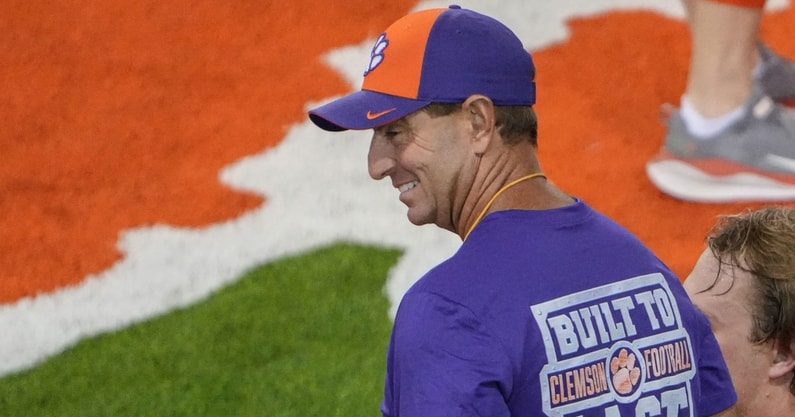Dabo Swinney reveals brutally honest conversations he had with Clemson walk-ons amid roster cap uncertainty

College coaches around the country have been forced to adjust to a rapid series of changes around the sport. Among the coaches who have been the most open with how those have affected his program has been Dabo Swinney as he tries to get the Clemson Tigers back to a national championship level.
Throughout this offseason, there has been some roster uncertainty about the size of the roster that teams would be able to carry going into the season. Because of that, as Swinney recently shared, he was forced to have some difficult conversations with walk-ons at Clemson.
“Then we had a couple kids like Sam Earle and Max Wilson, Seth Corontzes,” Dabo Swinney said. “We had some of those kids that came out in the spring, and we told them straight up, you’ve got zero chance to be on the 105. But, boy, we sure could use you if you want. Jack Purkerson. We’re like, ‘Hey, if you guys want to just go through mat drills.’ I said, ‘You can be on the team, but you’ve got to do everything, and I just want you to know with clear eyes, you’re gonna do all this, but you’re gonna be cut the week of the LSU game. But you get to be a part of it between now and then, and if you want to do that, hey, you can come on out.'”
The House settlement is best known for allowing revenue sharing with college athletes. However, a key aspect of it had to do with limiting roster sizes across sports, and how those limits would be implemented. Initially, that was going to be a cut-down in football to 105 roster spots by the 2025 season. However, that was adjusted to allow players to be grandfathered in, and the roster sizes will be reached over time. With that, those players Swinney initially feared he’d have to cut, can stick with the team for longer.
“And the cool thing about those kids is because they did something with no guarantees that was really, really hard, they created an opportunity for themselves in life. Because, if they had not done that, they wouldn’t be on the team now. So, that’s a cool lesson for them moving through their life. They chose to do something really hard that had absolutely no guarantees to it,” Swinney said. “And now they get to be on the team, and they’re grandfathered in until their eligibility is up. So, it’s cool.”
Top 10
- 1
College Football Playoff
The eye test for top teams
- 2New
Deion Sanders
Colorado demotes OC
- 3
Dabo Swinney
Refs need to answer for mistakes
- 4Trending
CFP Top 25 revealed
The official rankings are in
- 5
Notre Dame
Committee leans on feeling over data
Get the Daily On3 Newsletter in your inbox every morning
By clicking "Subscribe to Newsletter", I agree to On3's Privacy Notice, Terms, and use of my personal information described therein.
Long term, the House settlement is going to continue to have some major changes on college teams. That roster limit is going to continue to change how teams handle walk-on players. It’s even going to change how they recruit, with fewer roster spots available, forcing them to become more selective.
“That’s where we are,” Swinney said. “But like I said, we know who our 105 is and there might be a couple of kids over the next couple of years that get bumped up into that, but we’ll have to recruit to that as we go through it.”
The House settlement and roster limits aren’t unique to Clemson, and coaches around the country, like Dabo Swinney, are dealing with these changes. The hope, going into the year, is that it will help level the playing field and add some guardrails to the process of roster building moving forward.